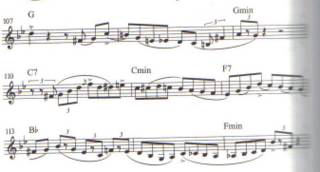
The mighty KoKo, 1:50-1:57

The new music was made in the shadows during the war, in hotel rooms, or after hours in clubs like Minton's in Harlem. Only when the recording bans and rationings were over was bebop finally immortalized. Dizzy Gillespie was first--in February and May '45, he, Charlie Parker and other conspirators recorded bop's cornerstones. Hot House. Dizzy Atmosphere. Salt Peanuts. Shaw 'Nuff.
On November 26, 1945, it was Charlie Parker's turn at last as bandleader. The session at WOR Studios in New York was chaotic: Parker's sax was acting up, prompting him to leave the studio mid-session to get a new one; Miles Davis, still a neophyte, wasn't up to some of the wilder music, so Dizzy, who had been brought in as a last-minute replacement for Bud Powell on piano (Powell was out helping his mother buy a house), doubled on trumpet.
Ray Noble's "Cherokee" had become talismanic for Parker. In 1939, while he was playing it, Parker had had an epiphany--for the first time, he would say later, he was able to play the music he was hearing in his head.
Now, however, Parker killed a first take of "Cherokee" after 30 seconds. He realized that if he did the conventional routine--theme, then solos, then theme reprise--there wouldn't be enough room on a 78 rpm record for what he wanted. So he just threw out the theme. All that was left of "Cherokee" was its chord structure, which Parker used as so much raw material for two genius solo choruses. Perhaps only Coleman Hawkins' "Body and Soul" had come this close to jazz as pure, radical, free thought. When it was over, producer Teddy Reig quickly named it "KoKo."
Charlie Parker, KoKo.
Everything about this recording is extraordinary--Dizzy and Bird's jabbing counterpart in the opening, Max Roach's pounding drum solo--and the Parker solos are so jammed with innovation, dense rhythms and melodies, that I still discover new riches with each new hearing, and I've been listening to it for 15 bloody years. Enjoy.
Parker (alto sax), Gillespie (trumpet, piano?), Argonne Thornton (piano?), Roach (d), Curly Russell (b). WOR-AM, in whose studios this was recorded, is still broadcasting in New York.
Info on Parker and "KoKo" from a host of sources, including Gary Giddins' Visions of Jazz, where the full Parker solo transcription can be found; Ted Gioia's History of Jazz, and the booklet to Charlie Parker: The Complete Savoy and Dial Recordings, where you can find "KoKo" among eight CDs full of great jazz.
With this, 1945 draws to a close-- '46 begins in a day or two.
Bonus unwanted opinion:
Best films of '45:
1) Marcel Carne and Jacques Prevert's Les Enfants du Paradis. The last gasp of Classical France--as if Balzac had made a film during the Occupation.
2) UK horror anthology Dead of Night.
3) Michael Powell and Emeric Pressburger's I Know Where I'm Going. Pretty, modern girl goes to Scotland to marry tycoon; chaos ensues.
4) John Huston and Frank Capra's Battle of San Pietro.
5) Rene Clair's And Then There Were None.
Hitchcock's Spellbound is a window into what the general public thought of Freudian theory (ridiculous crap for oversexed rich people, basically). And Ingrid Bergman gets to say the line "Liverwurst!" with rapturous joy.
No comments:
Post a Comment